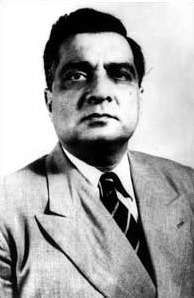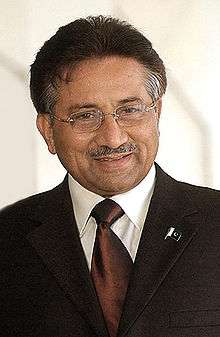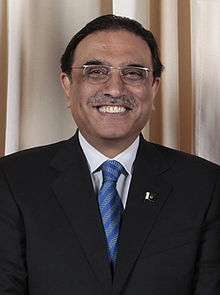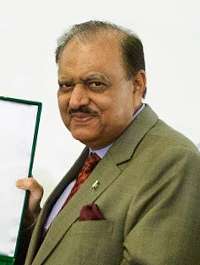List of Presidents of Pakistan
- The head of state of Pakistan from independence until Pakistan became a republic in 1956 was the British monarch. For the Governors-General who represented them from 1947 to 1956, see Governor-General of Pakistan.

 |
| This article is part of a series on the politics and government of Pakistan |
| Constitution |
|
The President of Pakistan is the head of state of the Islamic Republic of Pakistan. According to the Constitution of Pakistan, the President has "powers, subject to Supreme Court approval or veto, to dissolve the National Assembly, triggering new elections, and thereby dismissing the Prime Minister".[1] These powers were repeatedly modified through amendments to the constitution, which were introduced as the results of military coups and changes in government. Since the 18th Amendment to the Constitution was passed in 2010, Pakistan has been shifted back from semi-presidential to a parliamentary democratic republic. Under that system, the president has limited ruling powers, and performs ceremonial duties while the Prime Minister enjoys more powers to execute decisions.[2] The president is chosen by the Electoral College composed of the Senate, the National Assembly and the Provincial Assemblies.[3]
There have been eleven presidents of Pakistan since the introduction of the post in 1956.[4] The office was established when Pakistan was declared as a republic with the adoption of the 1956 constitution, and Iskander Mirza became the first president of the country.[5][6] Apart from these eleven, two acting presidents have also been in office for short periods of time. One of them, Wasim Sajjad, served as acting president on two non-consecutive occasions during 1993 and 1997–98.[7] The president may remain in office for a tenure of five years. In the case where a president's term of office is terminated early or during the absence of the president, the Chairman of the Senate assumes office.[3]
Six presidents have been members of a political party and four of them were active party members of the Pakistan People's Party (PPP). The first president was a retired military officer, four others were incumbent military officers of which three gained power through successful military coups in Pakistan's history – Ayub Khan in 1958, Muhammad Zia-ul-Haq in 1977 and Pervez Musharraf in 1999.[4][8] President Zia died in office when his aircraft crashed while returning from Bahawalpur to Islamabad on 17 August 1988.[9][10] Khan, during his two terms, remained in the office for the longest period with ten years and five months approximately.[n 1][11]
The current president of Pakistan is Mamnoon Hussain of the Pakistan Muslim League (N) (PML-N). He was elected president on 30 July 2013, winning a majority in the Electoral College with 432 of 702 votes, and took oath on 9 September 2013.[12][13]
Key
| Meaning | |
|---|---|
| Republican Party | |
| Pakistan Armed Forces | |
| Convention Muslim League | |
| Pakistan Peoples Party | |
| Pakistan Muslim League (N) | |
| Pakistan Muslim League (Q) | |
| Independent |
Presidents
| № | Portrait | Name (Birth–Death) |
Took office[4] | Left office[4] | Elections | Political party | Note(s) | |
|---|---|---|---|---|---|---|---|---|
| 1 |  |
Iskander Mirza[6][14] (1899–1969) |
23 March 1956 | 27 October 1958 | — | Republican Party | Mirza served as the last Governor-General of Pakistan and became its first president after the 1956 Constitution was promulgated, which established a republic.[3] He was deposed in a 1958 coup d'état by General Ayub Khan, whom Mirza had appointed as the Chief Martial Law Administrator in 1957.[11] | |
| 2 | |
Ayub Khan[11] (1907–1974) |
27 October 1958 | 8 June 1962[n 2] | — | — | Ayub took control over the country after the 1958 coup d'état. He led Pakistan into the 1965 war against India.[16] In 1969, Ayub resigned under pressure from opposition and handed over power to General Yahya Khan.[10] | |
| 8 June 1962 | 25 March 1969 | 2 January 1965[n 2] | Pakistan Muslim League (C) | |||||
| 3 | .jpg) |
Yahya Khan[17] (1917–1980) |
25 March 1969 | 20 December 1971 | — | — | Yahya took office after the resignation of Ayub Khan in 1969. He resigned after Pakistan's defeat to India in the 1971 war.[10] | |
| 4 | .jpg) |
Zulfikar Ali Bhutto[18] (1928–1979) |
20 December 1971 | 13 August 1973 | 20 December 1971 | Pakistan Peoples Party | Bhutto resigned as president to become the Prime Minister after the 1973 Constitution was promulgated, which established a parliamentary system of government.[10][19] | |
| 5 | Fazal Ilahi Chaudhry[20] (1904–1982) |
14 August 1973 | 16 September 1978 | 14 August 1973 | Pakistan Peoples Party | Chaudhry was the constitutional president, whose authority was exercised by Prime Minister Zulfikar Ali Bhutto. Chaudhry resigned in 1978 and handed over the presidency to General Zia.[14] | ||
| 6 | .jpg) |
Muhammad Zia-ul-Haq[9] (1924–1988) |
16 September 1978 | 17 August 1988 | — | — | Zia took de facto control over the country by leading the 1977 coup d'état. He served as the Chief Martial Law Administrator until 1979. He was killed in a plane crash, becoming the only president of Pakistan to die in office.[14][21] | |
| 7 | Ghulam Ishaq Khan[22] (1915–2006) |
17 August 1988 | 18 July 1993 | 13 December 1988 | Independent | Khan took office after the Zia's 1988 death. He attempted to dismiss the Nawaz Sharif government in 1993, but the Supreme Court overturned the president's decision. Khan eventually resigned, along with Sharif, in an agreement brokered by the Armed Forces.[23] | ||
| — | Wasim Sajjad[7] (1941–) Acting President |
18 July 1993 | 14 November 1993 | — | Pakistan Muslim League (N) | Sajjad was Chairman of the Senate.[7] | ||
| 8 | Farooq Leghari[24] (1940–2010) |
14 November 1993 | 2 December 1997 | 14 November 1993 | Pakistan Peoples Party | Leghari was elected president in 1993, after the resignation of Ghulam Ishaq Khan. Afterwards, Leghari clashed with Prime Minister Nawaz Sharif, and he finally resigned after being forced by the conservatives and persuaded by the Armed Forces.[25] | ||
| — | Wasim Sajjad[7] (1941–) Acting President |
2 December 1997 | 1 January 1998 | — | Pakistan Muslim League (N) | Sajjad was Chairman of the Senate.[7] | ||
| 9 | Muhammad Rafiq Tarar[26] (1929–) |
1 January 1998 | 20 June 2001 | 31 December 1997 | Pakistan Muslim League (N) | Tarar was the constitutional president, whose authority was exercised by Prime Minister Nawaz Sharif. Tarar resigned in 2001.[27] | ||
| 10 |  |
Pervez Musharraf[27] (1943–) |
20 June 2001 | 6 October 2007 | 1 January 2004[n 3] | — | Musharraf took de facto control over the country by leading the 1999 Pakistani coup d'état. He served as the Chief Executive until 2002.[27][29] Musharraf resigned the presidency in 2008, to avoid impeachment.[30] | |
| 6 October 2007 | 18 August 2008 | 6 October 2007 | Pakistan Muslim League (Q) | |||||
| — |  |
Muhammad Mian Soomro[14] (1950–) Acting President |
18 August 2008 | 9 September 2008 | — | Pakistan Muslim League (Q) | Soomro was Chairman of the Senate.[14] | |
| 11 |  |
Asif Ali Zardari[31] (1955–) |
9 September 2008 | 8 September 2013 | 6 September 2008 | Pakistan Peoples Party | Zardari was elected after Musharraf's resignation in 2008. The passage of the 18th Amendment in 2010 reduced his vast presidential powers to that of a ceremonial figurehead.[32] | |
| 12 |  |
Mamnoon Hussain[33] (1940–) |
9 September 2013 | Incumbent | 30 July 2013 | Pakistan Muslim League (N) | Hussain was elected the 12th President of Pakistan by a comfortable majority, and took office on 9 September 2013.[12][13] | |
See also
Notes
References
- ↑ "The President's Role". Presidency of the Islamic Republic of Pakistan. Retrieved 16 January 2013.
- ↑ "Pakistan parliament agrees to curb presidential powers". BBC News. 8 April 2010. Retrieved 4 July 2012.
- 1 2 3 "The constitution of the islamic republic of pakistan" (pdf). National Assembly of Pakistan. Retrieved 4 July 2012.
- 1 2 3 4 "Previous Presidents". Presidency of the Islamic Republic of Pakistan. 25 April 2011. Retrieved 16 January 2013.
- ↑ Monitoring Desk (14 November 2012). "Former President Iskander Mirza remembered". The Frontier Post. Retrieved 16 January 2013.
- 1 2 "Iskander Mirza". PakistanHerald.com. Retrieved 16 January 2013.
- 1 2 3 4 5 "Wasim Sajjad". DailyPakistan.com. Retrieved 16 January 2013.
- ↑ "World: South Asia – Pakistan's army and its history of politics". BBC News. 12 October 1999. Retrieved 16 January 2013.
- 1 2 Fathers, Michael (18 August 1998). "Obituary: President Mohammad Zia ul — Haq". The Independent. Retrieved 16 January 2013.
- 1 2 3 4 Ali, Hasan (19 August 2008). "4 military dictators among 14 heads of state under Officers' Club of Revolutionary Armed Forces". Daily Times. Retrieved 16 January 2013.
- 1 2 3 Aziz, Sartaj (2009). Between Dreams and Realities: Some Milestones in Pakistan’s History. Karachi, Pakistan: Oxford University Press. p. 408. ISBN 978-0-19-547718-4.
- 1 2 "Mamnoon Hussain elected as Pakistan's 12th president". The Express Tribune. Web Desk. 30 July 2013. Retrieved 30 July 2013.
- 1 2 Khan, Sumera; Manan, Abdul (30 July 2013). "Watershed moment: Asif Zardari basks in afterglow of democracy". The Express Tribune. Retrieved 9 September 2013.
- 1 2 3 4 5 Lodhi, Adnan (6 September 2008). "Only three completes presidential terms in over 60 years". Daily Times. Archived from the original on 21 January 2012. Retrieved 20 January 2013.
- ↑ "Field Marshal Muhammad Ayub Khan". Presidency of the Islamic Republic of Pakistan. Retrieved 20 January 2013.
- ↑ "Lessons of the 1965 War". Daily Times. 7 September 2005. Retrieved 20 January 2013.
- ↑ "Yahya Khan". Herald (Pakistan). Retrieved 16 January 2013.
- ↑ Paracha, Nadeem F. (4 April 2012). "Bhutto and I". Dawn. Retrieved 16 January 2013.
- ↑ Tasleem, Nauman (27 June 2004). "20 prime ministers since independence". Daily Times. Retrieved 9 September 2012.
- ↑ Staff Reporter (1 June 2012). "Ex-president of Pakistan Fazal Ilahi's anniversary today". SAMAA TV. Retrieved 16 January 2013.
- ↑ "Mohammad Zia-ul-Haq". Encyclopædia Britannica. Retrieved 12 July 2016.
- ↑ Khan, M Ilyas (27 October 2006). "Obituary: Ghulam Ishaq Khan". BBC News. Retrieved 16 January 2013.
- ↑ Masood, Salman (28 October 2006). "Ghulam Ishaq Khan, 91, Former President of Pakistan, Dies". The New York Times. Retrieved 16 January 2013.
- ↑ "Former Pakistani President Farooq Leghari dies". BBC News. 20 October 2010. Retrieved 16 January 2013.
- ↑ Burns, John F. (8 November 1996). "Pakistan's Bhutto Quandary". The New York Times. Retrieved 16 January 2013.
- ↑ "Tarar sworn in as Pakistani president". BBC News. 1 January 1998. Retrieved 16 January 2013.
- 1 2 3 "The rise and fall of Musharraf". Al Jazeera English. 18 August 2008. Retrieved 16 January 2013.
- ↑ Waldman, Amy (2 January 2004). "Pakistan gives Musharraf confidence vote as president". The New York Times. Retrieved 20 January 2013.
- ↑ Rohde, David (4 November 2007). "Musharraf Declares Emergency Rule". The New York Times. Retrieved 16 January 2013.
- ↑ "Pakistan's Musharraf will resign". BBC News. 18 August 2008. Retrieved 16 January 2013.
- ↑ "Profile: Asif Ali Zardar". BBC News. 16 December 2009. Retrieved 16 January 2013.
- ↑ "Bhutto's widower wins presidency". BBC News. 6 September 2008. Retrieved 17 January 2013.
- ↑ Khattak, Sohail (31 July 2013). "Mamnoon Hussain: A man of principles". The Express Tribune. Retrieved 9 September 2013.
External links
- "Presidents". WorldStatesman.org.